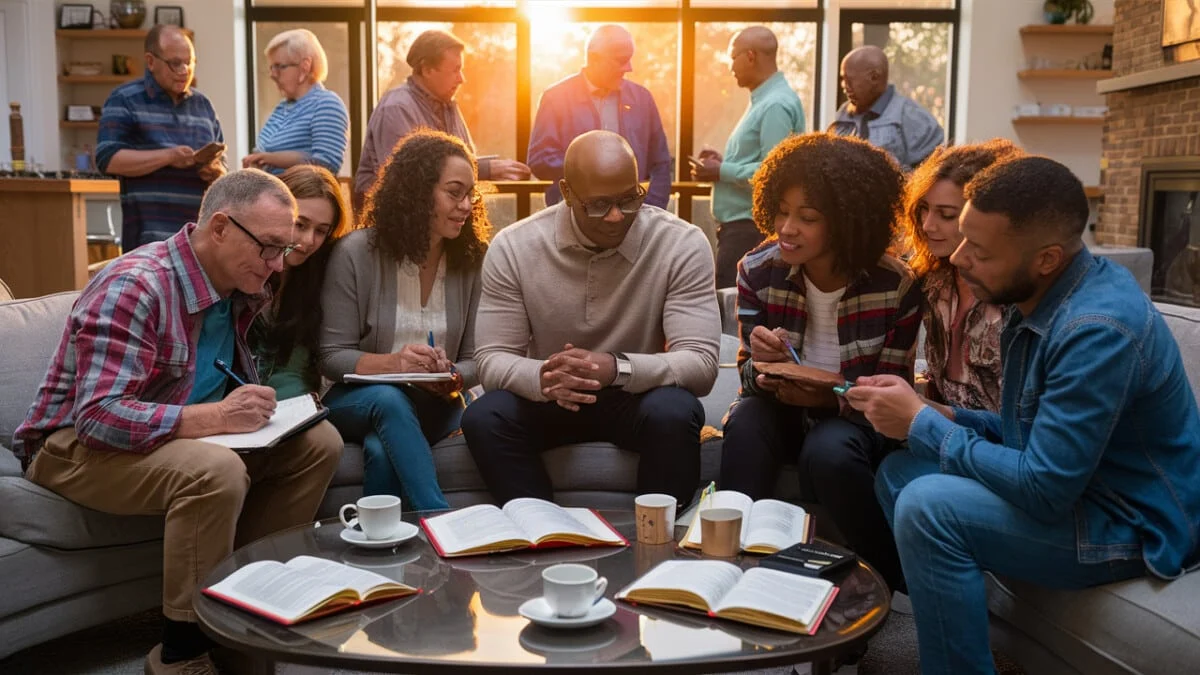Facilitating small group Bible study discussions is a rewarding way to deepen faith and build community. As a facilitator, you have the opportunity to guide meaningful conversations and help participants connect with Scripture. In this article, we’ll share strategies to create engaging discussions that encourage spiritual growth.
1. Create a Welcoming Environment
The first step in facilitating small group Bible study discussions is to create a welcoming environment. Make sure your space is comfortable and free from distractions. Set up chairs in a circle or semi-circle to promote interaction. As participants arrive, greet them warmly and encourage casual conversation. This approach will help everyone feel at ease and ready to engage in meaningful discussions.
Leading a small group Bible study requires thoughtful preparation to foster meaningful dialogue. A key strategy is creating an open environment where every participant feels comfortable sharing.
Just as facilitators research discussion guides, individuals in other areas, like those exploring www.bestaubettingsites.com, also seek reliable resources for informed participation. The core principle is the same: using trusted information to enhance engagement.
Effective questions that connect scripture to daily life can transform a simple meeting into a powerful spiritual conversation.

2. Establish Ground Rules
Before diving into the study, it’s essential to establish ground rules. Discuss the importance of respect, confidentiality, and active listening. Encourage participants to share their thoughts freely while being considerate of others’ opinions. Setting these guidelines at the beginning helps create a safe space where everyone feels comfortable sharing their insights and questions.
3. Choose Relevant Scripture
Selecting relevant Scripture for your discussions is crucial for facilitating small group Bible study discussions. Choose passages that resonate with the participants’ lives and experiences. Consider themes such as love, forgiveness, or hope. When the Scripture feels relevant, participants are more likely to engage and share their thoughts, leading to deeper conversations.
4. Use Open-Ended Questions
As a facilitator, your role is to guide the discussion without dominating it. One effective way to do this is by using open-ended questions. Instead of asking yes or no questions, pose questions that invite deeper reflection. For example, you might ask, “What does this passage teach us about God’s character?” Open-ended questions encourage participants to think critically and share their insights, enriching the discussion.
5. Encourage Personal Connections
Helping participants connect personally with the Scripture can make discussions more meaningful. Encourage them to share how the passages relate to their lives or experiences. For instance, if discussing a passage about forgiveness, ask, “Can anyone share a time when they struggled to forgive someone?” These personal connections can lead to powerful discussions and foster a sense of community.
6. Listen Actively
Active listening is an essential skill for facilitating small group Bible study discussions. Show genuine interest in what participants say by maintaining eye contact and nodding to show understanding. When someone shares, paraphrase their thoughts to confirm your understanding. This practice not only validates their feelings but also encourages others to contribute to the discussion.
7. Manage Different Perspectives
In any group, participants will have different perspectives and interpretations of Scripture. As a facilitator, it’s important to manage these differences respectfully. Encourage healthy debate while reminding participants to focus on mutual understanding rather than convincing others. Acknowledge differing viewpoints and guide the conversation back to the central theme of the discussion.
8. Incorporate Prayer
Incorporating prayer into your Bible study can create a spiritually enriching atmosphere. Begin or conclude your discussions with a prayer that aligns with the themes you’re exploring. This practice invites God into your discussions and helps participants feel more connected to their faith. Encourage participants to pray for one another, fostering a sense of unity and support within the group.
9. Be Flexible
While it’s important to have a plan for your discussions, being flexible is equally vital. If a particular topic or question sparks interest, allow the conversation to flow naturally. Sometimes, the most meaningful discussions arise from unexpected topics. Being adaptable allows participants to explore their thoughts and feelings in a way that feels genuine and relevant.
10. Follow Up After Sessions
After each small group Bible study discussion, consider following up with participants. Send a message thanking them for their contributions and sharing any additional thoughts or resources related to the discussion. This follow-up shows that you value their participation and encourages ongoing engagement with the Scripture. It can also prompt deeper reflection and connection between sessions.
Conclusion
Facilitating small group Bible study discussions is a powerful way to build community and deepen faith. By creating a welcoming environment, using open-ended questions, and encouraging personal connections, you can guide meaningful conversations. Remember to listen actively, manage different perspectives, and incorporate prayer. By following these strategies, you can foster an engaging and spiritually enriching experience for all participants.











